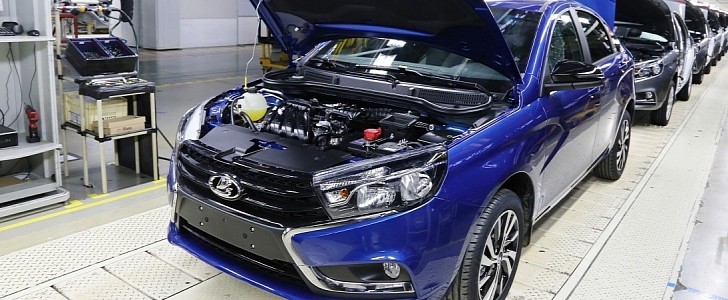A shortage of electronic components, together with stringent Western sanctions have sent Russia’s automotive industry back to the late 80s, with local carmakers now authorized to ignore Emissions standards and no longer obligated to fit their vehicles with important safety kit such as airbags, ESP, ABS or even seat belt pretensioners.
The easing of these production standards will reportedly remain in effect until February 1, 2023, making it easier for the government to certify the manufacturing of new vehicles, as reported by Le Figaro.
This same decree will also significantly reduce environmental standards, meaning driving a non-Euro compliant car (Euro 0) straight out of the showroom is now just as possible as doing the same but with a Euro 6-compliant vehicle.
Before the outbreak of the war and all the sanctions that followed, Russian carmakers were only allowed to put Euro-5 class and above vehicles in circulation. However, with the likes of Bosch suspending deliveries of components such as engine management systems, regulating emissions has become extremely difficult.
From the outside looking in, this is a staggering turn of events, especially after President Putin had repeatedly stated that despite all the sanctions, his country will still thrive by developing its own industries.
From a safety standpoint, purchasing a brand-new car without electronic stability control, anti-lock brakes, airbags and seat belt pretensioners is ridiculous and it wouldn’t shock us to see Russia’s GDP drop by more than an initially estimated 10%, as some buyers are sure to hold off purchasing new locally manufactured passenger vehicles – at least until that February 2023.
“We will drive with Euro 0, like in World War II, when we drove with gas cars, i.e., with firewood,” said one Sergey Aslanian, as quoted by RS News. The reason why they did that was because oil-based fuels all went to the military, so civilians were left having to use wood gasifiers.
Earlier this week, Moscow mayor Sergei Sobyanin came out and said that the government will be restarting production of passenger cars under the Soviet-era Moskvich brand. The way things are going, if some of those 80s Moskvich models could somehow time-jump into 2022, they would probably begin to feel right at home.
This same decree will also significantly reduce environmental standards, meaning driving a non-Euro compliant car (Euro 0) straight out of the showroom is now just as possible as doing the same but with a Euro 6-compliant vehicle.
Before the outbreak of the war and all the sanctions that followed, Russian carmakers were only allowed to put Euro-5 class and above vehicles in circulation. However, with the likes of Bosch suspending deliveries of components such as engine management systems, regulating emissions has become extremely difficult.
From the outside looking in, this is a staggering turn of events, especially after President Putin had repeatedly stated that despite all the sanctions, his country will still thrive by developing its own industries.
From a safety standpoint, purchasing a brand-new car without electronic stability control, anti-lock brakes, airbags and seat belt pretensioners is ridiculous and it wouldn’t shock us to see Russia’s GDP drop by more than an initially estimated 10%, as some buyers are sure to hold off purchasing new locally manufactured passenger vehicles – at least until that February 2023.
“We will drive with Euro 0, like in World War II, when we drove with gas cars, i.e., with firewood,” said one Sergey Aslanian, as quoted by RS News. The reason why they did that was because oil-based fuels all went to the military, so civilians were left having to use wood gasifiers.
Earlier this week, Moscow mayor Sergei Sobyanin came out and said that the government will be restarting production of passenger cars under the Soviet-era Moskvich brand. The way things are going, if some of those 80s Moskvich models could somehow time-jump into 2022, they would probably begin to feel right at home.








